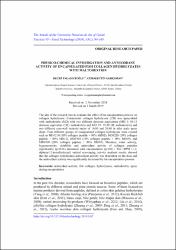PHYSICO-CHEMICAL INVESTIGATION AND ANTIOXIDANT ACTIVITY OF ENCAPSULATED FISH COLLAGEN HYDROLYZATES WITH MALTODEXTRIN
Özet
The aim of the research was to evaluate the effect of the encapsulation process on collagen hydrolysate. Commercial collagen hydrolysate (CH) was spray-dried with maltodextrin (MD) with two different dextrose equivalents (MD12: 10-12 dextrose equivalent (DE) maltodextrin and MD 19: 19-20 DE maltodextrin) and two different core-wall material ratios of 10: 90 and 20: 80 in pilot scale spray dryer. Four different groups of encapsulated collagen hydrolysate were created such as MD1210 (10% collagen peptide + 90% MD12), MD1220 (20% collagen peptide + 80% MD12), MD1910 (10% collagen peptide + 90% MD19), and MD1920 (20% collagen peptide + 80% MD19). Moisture, water activity, hygroscopicity, solubility and antioxidant activity of collagen peptides significantly (p. 0.01) decreased with encapsulation (p=0.01). The DPPH (1,1-diphenyl-2-picrylhydrazyl) radical scavenging activity analysis results showed that the collagen hydrolysates antioxidant activity was dependent on the dose and the antioxidant activity was significantly decreased by the encapsulation process.
















